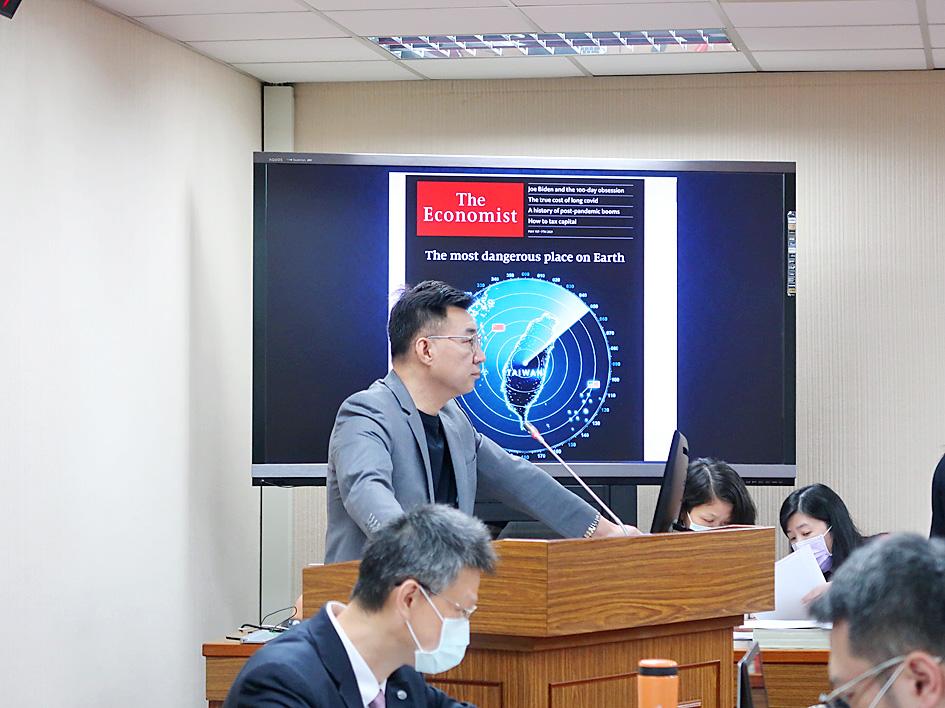The nation’s armed forces remain at “normal combat readiness status,” despite tensions across the Taiwan Strait and a foreign magazine calling Taiwan “the most dangerous place on Earth,” Deputy Minister of National Defense Chang Che-ping (張哲平) said yesterday.
The military continuously adjusts the number of troops on alert depending on developments in the security situation around Taiwan, Chang told a meeting of the legislature’s Foreign Affairs and National Defense Committee.
Chinese Nationalist Party (KMT) Chairman Johnny Chiang (江啟臣), who is also a legislator, asked Chang about the cover story in the latest issue of The Economist, which called Taiwan “the most dangerous place on Earth” and “an arena for rivalry between China and the United States.”

Photo: Chen Yu-fu, Taipei Times
Cross-strait tensions have risen in the past few months as China’s military increased the intensity and frequency of maneuvers by its aircraft and warships around Taiwan, Chang said.
The Chinese People’s Liberation Army has conducted at least 270 sorties into airspace and waters near Taiwan, Ministry of National Defense data showed.
Chang said the risk of an armed conflict in the Strait would be high if the US and China fail to ease the tensions between them, or Taiwan and China fail to engage in dialogue to build mutual trust.
To prevent the occurrence of an unplanned military encounter, all Taiwanese military personnel receive comprehensive briefings before going on missions, Chang told lawmakers, adding that the nation closely cooperates on intelligence with like-minded countries.
“Normal combat readiness status” is one of two general alert levels in the military, and remains active during peacetime and natural disasters when civilian authorities need military support.
The other level is “defensive combat status” and is activated when an enemy attack is imminent or during other emergencies.
When separately asked by reporters about the issue, Minister of National Defense Chiu Kuo-cheng (邱國正) said it is true that Taiwan’s situation is serious, “but we should not bound around at the suggestion of others.”
Chiu also vowed to improve communication with the coast guard and make improvements after a Chinese man on Friday crossed the Strait on a rubber dinghy undetected.
The 33-year-old man, surnamed Zhou (周), said he bought the inflatable boat on the Chinese e-commerce Web site Taobao and traveled in it for 10 hours from Shishi in China’s Fujian Province to the Port of Taichung, where he was detained by the coast guard.
He is being held in quarantine awaiting further investigation, the coast guard said.
Answering lawmakers’ questions at the committee meeting yesterday, Navy Command Chief of Staff Chiang Cheng-kuo (蔣正國) said it is difficult to detect the kind of small raft piloted by Zhou.
Coast guard radars might have detected the boat, he said.
However, naval vessels and coastal radar systems could not detect it, as it was likely obscured by echoes caused by waves, he added.
If Zhou had arrived in daytime, he would have been spotted by the navy or fishers, Chiang said, adding that thermal imaging could be used at night.
Responding to criticism that the incident represents a serious breach of national security, National Security Bureau Deputy Director-General Hu Mu-yuan (胡木源) said the authenticity of Zhou’s claims are still under investigation.
An enemy would look to exploit gaps in the nation’s defenses no matter what, Hu said, adding that security officials would examine any potential vulnerabilities.
Additional reporting by Aaron Tu and Chen Yu-fu

EVA Airways today confirmed the death of a flight attendant on Saturday upon their return to Taiwan and said an internal investigation has been launched, as criticism mounted over a social media post accusing the airline of failing to offer sufficient employee protections. According to the post, the flight attendant complained of feeling sick on board a flight, but was unable to take sick leave or access medical care. The crew member allegedly did not receive assistance from the chief purser, who failed to heed their requests for medical attention or call an ambulance once the flight landed, the post said. As sick

A drunk woman was sexually assaulted inside a crowded concourse of Taipei Railway Station on Thursday last week before a foreign tourist notified police, leading to calls for better education on bystander intervention and review of security infrastructure. The man, surnamed Chiu (邱), was taken into custody on charges of sexual assault, taking advantage of the woman’s condition and public indecency. Police discovered that Chiu was a fugitive with prior convictions for vehicle theft. He has been taken into custody and is to complete his unserved six-month sentence, police said. On Thursday last week, Chiu was seen wearing a white

The Taichung District Court yesterday confirmed its final ruling that the marriage between teenage heir Lai (賴) and a man surnamed Hsia (夏) was legally invalid, preventing Hsia from inheriting Lai’s NT$500 million (US$16.37 million) estate. The court confirmed that Hsia chose not to appeal the civil judgement after the court handed down its ruling in June, making the decision final. In the June ruling, the court said that Lai, 18, and Hsia, 26, showed “no mutual admiration before the marriage” and that their interactions were “distant and unfamiliar.” The judge concluded that the couple lacked the “true intention of

EVA Airways, one of the leading international carriers in Taiwan, yesterday said that it was investigating reports that a cabin crew manager had ignored the condition of a sick flight attendant, who died on Saturday. The airline made the statement in response to a post circulating on social media that said that the flight attendant on an outbound flight was feeling sick and notified the cabin crew manager. Although the flight attendant grew increasingly ill on the return flight, the manager did not contact Medlink — a system that connects the aircraft to doctors on the ground for treatment advice during medical